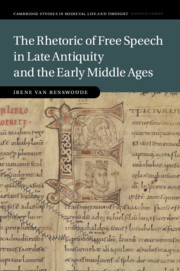
- Cited by 18
-
Cited byCrossref Citations
This Book has been cited by the following publications. This list is generated based on data provided by Crossref.
2019. Epitaph for an Era. p. 71.
2019. Epitaph for an Era. p. 178.
2019. Epitaph for an Era. p. 206.
de Jong, Mayke 2019. Epitaph for an Era.
2019. Epitaph for an Era. p. 232.
2019. Epitaph for an Era. p. 1.
2019. Epitaph for an Era. p. 257.
2019. Epitaph for an Era. p. 44.
2019. Epitaph for an Era. p. 132.
2019. Epitaph for an Era. p. 151.
2019. Epitaph for an Era. p. 102.
2019. Epitaph for an Era. p. xi.
2019. Epitaph for an Era. p. 19.
2019. Epitaph for an Era. p. 228.
Lefteratou, Anna 2022. Jesus’ Socratic Trial and Pilate’s Confession in Nonnus’ Paraphrasis of St John’s Gospel. Millennium, Vol. 19, Issue. 1, p. 219.
Dabhoiwala, Fara 2023. Liberty, Slavery, and Biography: The Hidden Shapes of Free Speech. Journal of British Studies, Vol. 62, Issue. 1, p. 104.
Tarman, Settar 2024. Mesih’in Müritleri Olarak Hristiyan Martyrlerin Parrhēsia Bağlamında Değerlendirilmesi. Sanat Tarihi Dergisi, Vol. 33, Issue. 1, p. 443.
Meeder, Sven 2024. Aneignungen der Geschichte. p. 133.
- Publisher:
- Cambridge University Press
- Online publication date:
- September 2019
- Print publication year:
- 2019
- Online ISBN:
- 9781139811941


